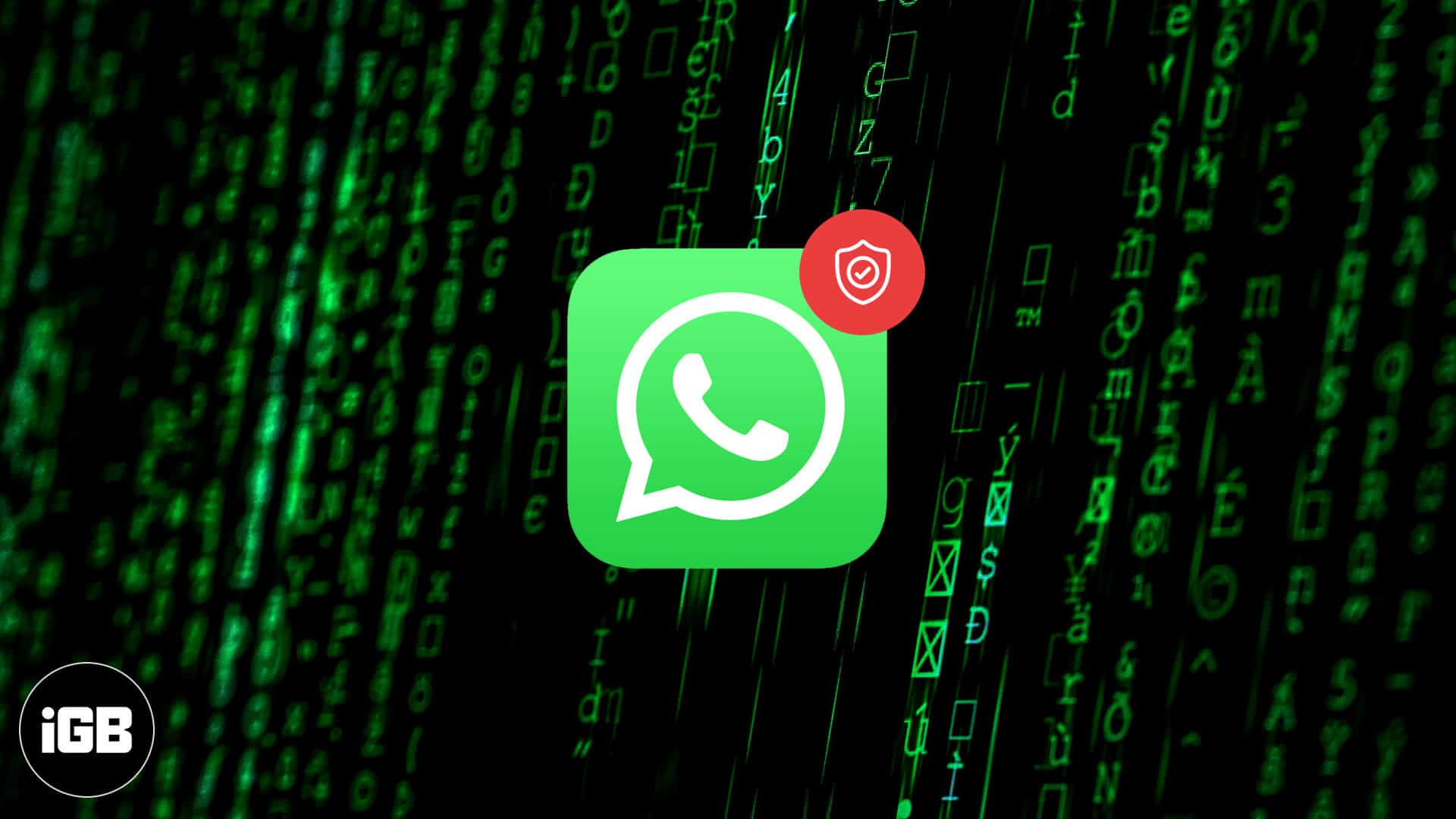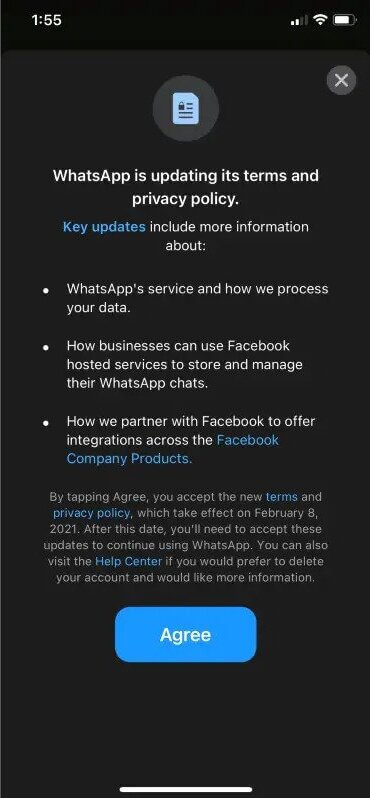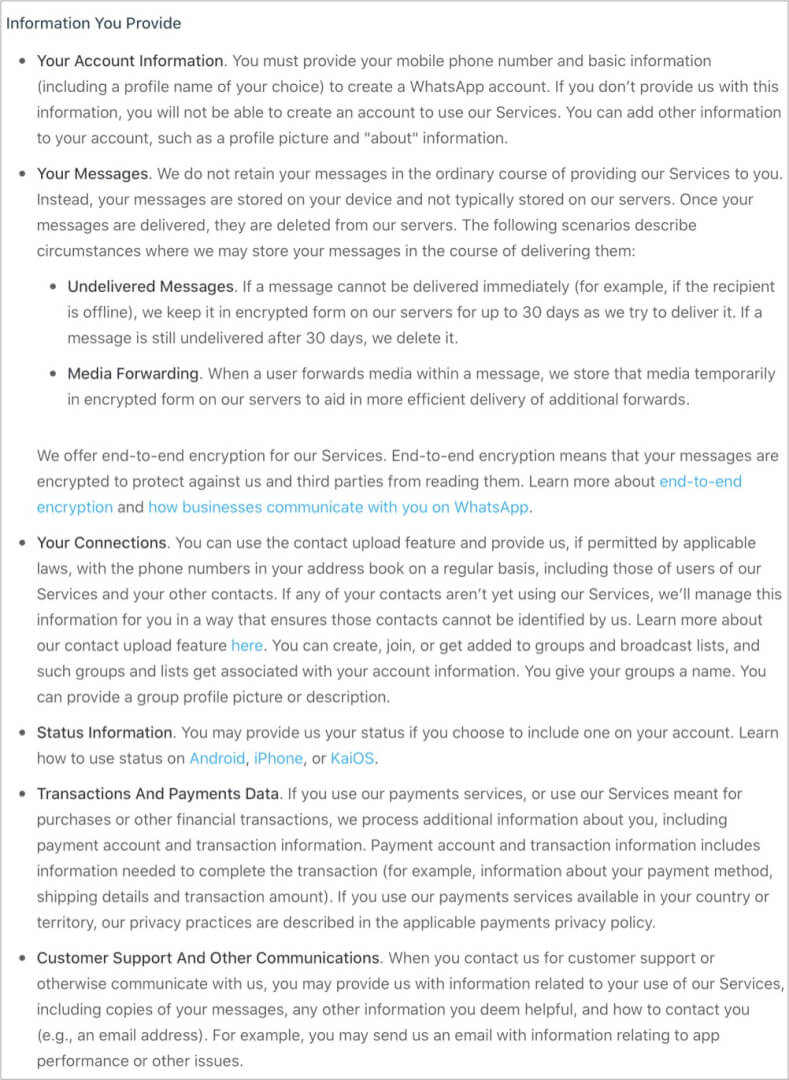Most apps often update their terms of use, but the latest WhatsApp Privacy Policy 2021 has caused quite a stir. If you’re confused and want to make sense of the details, keep reading. I have tried to answer all your questions.

What’s notable is that WhatsApp is openly providing details around user data collection and storage for the first time. This spells some significant changes that you need to understand, and it’s mandatory to accept the policy by May 15, 2021, to continue using the messaging platform.
UPDATE: At the start of May 2021, WhatsApp announced that you will not lose your account if you do not accept the new policy. However, you will have only limited access to your account.
So, if you plan to continue using this messaging app, it’s advisable to accept the policy. But before you do, here’s everything you need to know about the WhatsApp Privacy Policy.
What is new in WhatsApp privacy policy update 2021?
There are three main kinds of changes coming to WhatsApp in 2021. They center around how:
- WhatsApp processes your data.
- businesses use Facebook services to store and manage WhatsApp chats.
- WhatsApp will integrate with other Facebook products.
So let’s clarify the answers to the most pressing questions you might have about this.
Why do I need to accept this policy?
If you do not accept WhatsApp’s latest terms and conditions, you will get only limited access to WhatsApp features post May 15, 2021. Your account will not be deleted, but you will see a persistent reminder to accept the new terms. So, you must accept the policy to continue using WhatsApp as usual.
To do so, whenever you see the new policy popup on your screen, tap on AGREE to continue using the messaging platform as usual.

What personal data will WhatsApp collect and store?
According to its new policy, WhatsApp will collect hardware data such as:
- mobile network, connection information (including phone number, mobile operator or ISP),
- your phone’s battery level and signal strength,
- app version,
- browser information,
- language and time zone,
- your IP address,
- device operations information, and identifiers (including identifiers unique to Facebook Company Products associated with the same device or account).
None of this was part of the previous policy.
According to the policy changes, WhatsApp can share almost all of the information mentioned above with Facebook. The terms clearly state that your phone number, IP address, mobile device information, how you interact with others and businesses, etc.
WhatsApp Privacy Policy FAQs:
Why you won’t be able to use WhatsApp if you don’t accept the new T&C?
WhatsApp has made it mandatory for all users to accept the new policy changes. If you do not agree to the updates by May 15, 2021, your account will begin to get restricted access to features such as chats and calls. So, there are no two ways about it. If you want to continue using WhatsApp, you will eventually have to accept the new terms and conditions.
How do I maintain privacy on WhatsApp?
Well, from now on, your data from WhatsApp, such as your phone number, businesses you interact with, etc., will be shared with Facebook. However, your chats will continue to be encrypted end-to-end, so they are still private.
Can a third party access my WhatsApp?
Going by the official policy, third parties may access the information you share with businesses on WhatsApp. However, regardless of the policy changes, third parties can also access your WhatsApp account through unlawful means like hacking. However, this is a rare case scenario and not something you should worry about. After all, any app or device is susceptible to hacking. It’s just part of living in the technological age.
Will I see ads on WhatsApp?
WhatsApp has so far provided an ad-free experience, and the new policy retains this stance for the time being. It says that if ads are ever introduced, the policy will be updated again. However, I think it’s pretty certain that at some point in the near future, ads will indeed appear in WhatsApp, most probably beginning from the “Status” section, similar to how ads appear in Instagram and Facebook stories.
Does WhatsApp sell data?
Well, this depends on how you look at it. In a way, WhatsApp will be using your information to target you with services or products that may interest you. In the future, it will possibly use your data to show you personalized ads in the same way that Facebook, Instagram, Google, and others do.
Can anyone see my WhatsApp chats?
The short answer is no. WhatsApp chats remain end-to-end encrypted, so your messages are private for now.
What about WhatsApp Business?
If you interact with businesses on WhatsApp, they may provide the platform with information about you. The updated policy states that any content shared with a business on WhatsApp will be accessible by “several people in that business.”
Moreover, businesses may work with third-party service providers to manage communications with customers. Such providers might also include Facebook. To better understand this, WhatsApp recommends that you read the “business’ privacy policy or contact the business directly.”
This is undoubtedly a call to action to be more vigilant about how you interact with businesses on WhatsApp.
What about WhatsApp Payments data?
WhatsApp rolled out WhatsApp payments in many countries, and the new privacy policy talks about this too. It says that if you use WhatsApp payments services, additional information about you will be processed, such as your account and transaction information. However, this might differ from country to country according to local regulations.
Should I delete my WhatsApp account?
If you are highly concerned and don’t want Facebook accessing your data, you should delete your WhatsApp account and use alternatives like Telegram or Signal. However, do bear in mind that deleting your account will not necessarily delete all your data from the servers. WhatsApp is vague about what data it will continue to store after you delete your account.
WhatsApp privacy policy explained!
We hope this has answered all your questions about the changes in the WhatsApp privacy policy 2021. In a nutshell, it implies that WhatsApp is clearly a Facebook product now and will not retain the same kind of experience it has given over the years of its growing popularity.
Are you going to continue using this messaging platform? Share your take in the comments below.
You may want to take a peek at:

